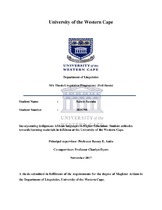| dc.description.abstract | There have been extensive studies conducted on the language attitudes of students or their
parents at primary, secondary as well as tertiary levels of education in South Africa. Many
scholars have found that African language speakers hold negative attitudes towards their own
languages (De Klerk, 2000; Barkhuizen, 2002; Dyers, 1999; and Conduah, 2003). This is rather
unfortunate, given the several constitutional and other policy provisions in South Africa
promoting multilingual education (see Constitution, 1996; Language-in-education policy, 1997;
Higher education language policy, 2002; UWC language policy, 2003). These negative attitudes
have been attributed to a number of factors by scholars (see Kamwangamalu, 2000; Somhlahlo,
2009; Alexander 2004). | |

